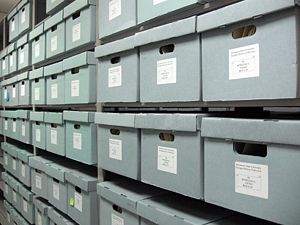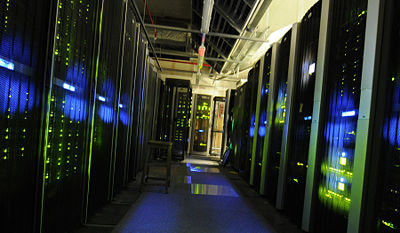Digital Archives
From DigitalRhetoricCollaborative
| (16 intermediate revisions not shown.) | |||
| Line 1: | Line 1: | ||
[[Image:3567689465 8e8d15b486 o.jpg | thumb | right | Stacks in the archives and records management department at Kennesaw State University. [https://flic.kr/p/6rgkMk Image by Anne G.] | 300px]] | [[Image:3567689465 8e8d15b486 o.jpg | thumb | right | Stacks in the archives and records management department at Kennesaw State University. [https://flic.kr/p/6rgkMk Image by Anne G.] | 300px]] | ||
| - | A '''digital archive''' is an accumulation of historical records and other primary source information | + | A '''digital archive''' is an accumulation of historical records and other primary source information. |
| - | + | A litany of items can be digitally archived, including but not limited to photographs, manuscripts, memoirs and numerical data. Practically any traditionally archived object can be replicated in some digital format, and digital archives are created and continue to be built upon every day. | |
__TOC__ | __TOC__ | ||
| - | =History= | + | ==History== |
[[Image:A view of the server room at The National Archives.jpg|thumb|A view of the server room at The National Archives, UK. | 400px]] | [[Image:A view of the server room at The National Archives.jpg|thumb|A view of the server room at The National Archives, UK. | 400px]] | ||
| - | The history of archiving as a means of preserving meaningful materials or content | + | The history of archiving as a means of preserving meaningful materials or content has been traced back to Ancient Syria and Egypt, where these societies would create and maintain clay tablets to record important information. These tablets have been monumental in the transcription of ancient languages and the discovery of these cultures. The Ancient Greeks and Romans preserved a wealth of information within archives and libraries. The library of Alexandria, which flourished under the Ptolemaic dynasty of Egypt, is the most famous repository of antiquity in that it was notoriously lost. <ref>http://www.britannica.com/EBchecked/topic/14417/Library-of-Alexandria</ref> |
| + | Modern archival practice has its roots at the turn of 18th century in France. After the French Revolution a trove of private documents and items were taken into the care of the newly founded Archives Nationales. The French National Archives contains records that date back to 625 C.E. | ||
===The Oxford Text Archive=== | ===The Oxford Text Archive=== | ||
The Oxford Text Archive is considered by many to be the world's oldest digital repository. <ref>"Oxford Archive of Electronic Literature". Association for Literary and Linguistic Computing Bulletin 5 (2): 205. 1977.</ref> It was established in 1976 "to collect, catalogue, preserve, and distribute the electronic products of research and scholarship in all areas of textual, literary, and linguistic studies. The OTA holds an extensive collection of electronic texts and linguistic corpora in a variety of languages which are of interest to academics working in the humanities." <ref>http://www.tei-c.org/Activities/Projects/ox01.xml</ref> | The Oxford Text Archive is considered by many to be the world's oldest digital repository. <ref>"Oxford Archive of Electronic Literature". Association for Literary and Linguistic Computing Bulletin 5 (2): 205. 1977.</ref> It was established in 1976 "to collect, catalogue, preserve, and distribute the electronic products of research and scholarship in all areas of textual, literary, and linguistic studies. The OTA holds an extensive collection of electronic texts and linguistic corpora in a variety of languages which are of interest to academics working in the humanities." <ref>http://www.tei-c.org/Activities/Projects/ox01.xml</ref> | ||
| - | =Process= | + | ==Process== |
| - | [https://webservices.itcs.umich.edu/mediawiki/DigitalRhetoricCollaborative/index.php/Curation Curation] is the process by which archived documents and items are selected, collected and arranged. | + | [https://webservices.itcs.umich.edu/mediawiki/DigitalRhetoricCollaborative/index.php/Curation Curation] is the process by which archived documents and items are selected, collected and arranged. Metadata is the contextual information that must be included with any digitally archived object. It is exigent that metadata is thorough and in tact, because photographs and textual descriptions cannot always accurately replicate the physical presence and aesthetic of a physical object. For example, a high-quality scan of a diary entry may make the penciled writing difficult to read, but the disparity can be bridged with accurate transcription and a detailed description of the diary's page.<ref>https://digitalparkhall.omeka.net/exhibits/show/coppernoll/item/80</ref> |
| - | + | ||
| - | + | An individual who works with archives is called an archivist. Qualifications for the occupation of a digital archivist vary. Some institutions of learning place more emphasis on "programming skills such as PERL, XSLT, Ruby, HTML and experience working with SQL databases and repositories such as DSpace and Fedora," as well as a "variety of metadata standards" and "computer forensic tools such as FTK Imager, AccessData Forensic Toolkits and writeblockers." <ref>http://blogs.loc.gov/digitalpreservation/2014/10/what-does-it-take-to-be-a-well-rounded-digital-archivist/</ref> | |
| - | + | ||
| - | + | Archives are valuable to everyone in society. Researchers, journalists, lawyers and others who seek a historical perspective flock to archives. "All state governments as well as many local governments, universities, businesses, libraries and historical societies maintain archives."<ref>http://americanhistory.si.edu/archives/about/what-are-archives</ref> | |
| - | Archives | + | |
| - | =External Links= | + | |
| + | ===Databases=== | ||
| + | A database is an organized, curated collection of data <ref>http://www.merriam-webster.com/dictionary/database </ref>. Databases are organized with a variety of models that allow for the most efficient retrieval of the data that they contain. A "database management system" (DBMS) allows users to interact with various databases in order to access a variety of stored content. Archives and libraries use a variety of databases and a DBMS to efficiently organize and access archived items. | ||
| + | |||
| + | ==Resource in Education== | ||
| + | Digital media offers a great deal of benefit for K-12 learning, and higher education as well. Because of the availability of digital repositories containing a wealth of educational material, teachers can access and build tools for customized use in their classrooms.<ref>http://www.seenmagazine.us/articles/article-detail/articleid/2886/a-digital-transformation-of-k-12-education.aspx</ref> | ||
| + | |||
| + | Digital archives offer an abundance of primary resources for innovative education. When working with archives for research in their coursework and projects, "participating students [are] more engaged with and excited about their coursework, sho[w] improvement in key academic skills, and achiev[e] better course outcomes than their peers." Professors and faculty members, in learning newly-established practices for teaching with primary resources, become "more thoughtful and effective instructors." <ref>http://www.teacharchives.org/articles/our-findings/</ref> | ||
| + | |||
| + | ==External Links== | ||
*[http://en.wikipedia.org/wiki/Archive Wikipedia/Archive] | *[http://en.wikipedia.org/wiki/Archive Wikipedia/Archive] | ||
| + | *[http://en.wikipedia.org/wiki/Archives_nationales_(France) Wikipedia/Archives Nationales] | ||
*[http://en.wikipedia.org/wiki/Database Wikipedia/Database] | *[http://en.wikipedia.org/wiki/Database Wikipedia/Database] | ||
*[http://www.teacharchives.org TeachArchives.org] | *[http://www.teacharchives.org TeachArchives.org] | ||
*[http://cs.fit.edu/~pbernhar/dbms.html List of Database Management Systems] | *[http://cs.fit.edu/~pbernhar/dbms.html List of Database Management Systems] | ||
| - | =References= | + | ==References== |
<references /> | <references /> | ||
---- | ---- | ||
--[[User:corbettk@uga.edu|K.E. Corbett]] | --[[User:corbettk@uga.edu|K.E. Corbett]] | ||
Current revision

A digital archive is an accumulation of historical records and other primary source information.
A litany of items can be digitally archived, including but not limited to photographs, manuscripts, memoirs and numerical data. Practically any traditionally archived object can be replicated in some digital format, and digital archives are created and continue to be built upon every day.
Contents |
[edit] History
The history of archiving as a means of preserving meaningful materials or content has been traced back to Ancient Syria and Egypt, where these societies would create and maintain clay tablets to record important information. These tablets have been monumental in the transcription of ancient languages and the discovery of these cultures. The Ancient Greeks and Romans preserved a wealth of information within archives and libraries. The library of Alexandria, which flourished under the Ptolemaic dynasty of Egypt, is the most famous repository of antiquity in that it was notoriously lost. [1]
Modern archival practice has its roots at the turn of 18th century in France. After the French Revolution a trove of private documents and items were taken into the care of the newly founded Archives Nationales. The French National Archives contains records that date back to 625 C.E.
[edit] The Oxford Text Archive
The Oxford Text Archive is considered by many to be the world's oldest digital repository. [2] It was established in 1976 "to collect, catalogue, preserve, and distribute the electronic products of research and scholarship in all areas of textual, literary, and linguistic studies. The OTA holds an extensive collection of electronic texts and linguistic corpora in a variety of languages which are of interest to academics working in the humanities." [3]
[edit] Process
Curation is the process by which archived documents and items are selected, collected and arranged. Metadata is the contextual information that must be included with any digitally archived object. It is exigent that metadata is thorough and in tact, because photographs and textual descriptions cannot always accurately replicate the physical presence and aesthetic of a physical object. For example, a high-quality scan of a diary entry may make the penciled writing difficult to read, but the disparity can be bridged with accurate transcription and a detailed description of the diary's page.[4]
An individual who works with archives is called an archivist. Qualifications for the occupation of a digital archivist vary. Some institutions of learning place more emphasis on "programming skills such as PERL, XSLT, Ruby, HTML and experience working with SQL databases and repositories such as DSpace and Fedora," as well as a "variety of metadata standards" and "computer forensic tools such as FTK Imager, AccessData Forensic Toolkits and writeblockers." [5]
Archives are valuable to everyone in society. Researchers, journalists, lawyers and others who seek a historical perspective flock to archives. "All state governments as well as many local governments, universities, businesses, libraries and historical societies maintain archives."[6]
[edit] Databases
A database is an organized, curated collection of data [7]. Databases are organized with a variety of models that allow for the most efficient retrieval of the data that they contain. A "database management system" (DBMS) allows users to interact with various databases in order to access a variety of stored content. Archives and libraries use a variety of databases and a DBMS to efficiently organize and access archived items.
[edit] Resource in Education
Digital media offers a great deal of benefit for K-12 learning, and higher education as well. Because of the availability of digital repositories containing a wealth of educational material, teachers can access and build tools for customized use in their classrooms.[8]
Digital archives offer an abundance of primary resources for innovative education. When working with archives for research in their coursework and projects, "participating students [are] more engaged with and excited about their coursework, sho[w] improvement in key academic skills, and achiev[e] better course outcomes than their peers." Professors and faculty members, in learning newly-established practices for teaching with primary resources, become "more thoughtful and effective instructors." [9]
[edit] External Links
- Wikipedia/Archive
- Wikipedia/Archives Nationales
- Wikipedia/Database
- TeachArchives.org
- List of Database Management Systems
[edit] References
- ↑ http://www.britannica.com/EBchecked/topic/14417/Library-of-Alexandria
- ↑ "Oxford Archive of Electronic Literature". Association for Literary and Linguistic Computing Bulletin 5 (2): 205. 1977.
- ↑ http://www.tei-c.org/Activities/Projects/ox01.xml
- ↑ https://digitalparkhall.omeka.net/exhibits/show/coppernoll/item/80
- ↑ http://blogs.loc.gov/digitalpreservation/2014/10/what-does-it-take-to-be-a-well-rounded-digital-archivist/
- ↑ http://americanhistory.si.edu/archives/about/what-are-archives
- ↑ http://www.merriam-webster.com/dictionary/database
- ↑ http://www.seenmagazine.us/articles/article-detail/articleid/2886/a-digital-transformation-of-k-12-education.aspx
- ↑ http://www.teacharchives.org/articles/our-findings/
--K.E. Corbett

